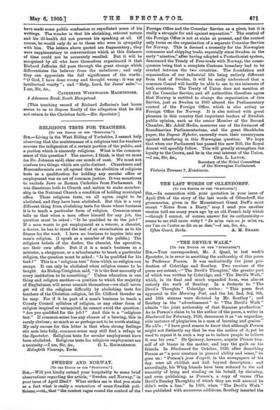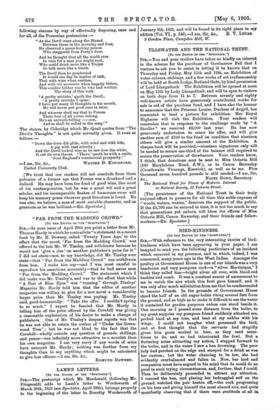[To THE EDITOR OF THE " SPECTATOR. "] Sin,—Your correspondent, Mr.
J. Quail, in last week's Spectator, is in error in ascribing the authorship of this poem to Professor Porson. It was undoubtedly the joint pro- duction of Coleridge and Southey. Two versions of the poem are extant,—" The Devil's Thoughts," the greater part of which was written by Coleridge, and " The Devil's Walk," which, in its final and much expanded form, was almost entirely the work of Southey. In a footnote to " The Devil's Thoughts " Coleridge writes : " This poem first appeared in the Morning Post; and the 1st, 2nd, 3rd, 9th, and 16th stanzas were dictated by Mr. Southey "; and Southey in the " advertisement " to " The Devil's Walk " admits "the joint authorship of that Siamese production." As to Porson's claim to be the author of the poem, a writer in Blackwood for February, 1826, denounces it as "an unpardon- able instance of plagiarism in a man of learning and genius." He adds : " I have good reason to know that although Porson might not distinctly say that he was the author of it, yet ho used to repeat it in such a way as to induce people to believe it was his own." De Quincey, however, acquits Porson him- self of all blame in the matter, and lays the guilt on his friends. In Blackwood for October, 1830, after describing Porson as "a poor creature in general ability and sense," he goes on : " Poison's jeux d'esprit, in the newspapers of his day, were all childish and dull beyond description : and accordingly, his Whig friends have been reduced to the sad necessity of lying and stealing on his behalf, by claiming, and even publishing, as Porson's, a copy of verses (The Devil's Sunday Thoughts) of which they are well assured be didn't write a line." In 1838, when " The Devil's Walk " was published with numerous additions, Southey inserted the
following stanzas by way of effectually disposing, once and for all, of the Porsonian pretensions :—
" As the Devil went along the Strand Between three in the morning and four, He observed a queer-looking person Who staggered from Perry's door.
And he thought that all the world over In vain for a man you might seek, Who could drink more like a Trojan Or talk more like a Greek.
The Devil then he prophesied It would one day be matter of talk, That with wine when smitten, And with wit moreover when happily bitten, This erudite bibber was he who bad written The story of this walk.
A pretty mistake,' quoth the Devil; 'A pretty mistake I opine!
I have put many ill thoughts in his mouth, He will never put good ones in mine.
And whoever shall say that to Porson These best of all verses belong, He's an untruth-telling —son, And so shall be called in the song.'"
The stanza by Coleridge which Mr. Quail quotes from "The Devil's Tkoughts " is not quite correctly given. It runs as follows :-
" Down the river did glide, with wind and with tide, A pig with vast celerity ;
And the Devil looked wise as he saw how the while, It cut its own throat. ' There,' quoth be with a smile, 'Goes England's commercial prosperity.' '
United University Club.
[We trust that our readers will not conclude from these polemics of a former age that Porson was a drunkard and a dullard. He may have been too fond of good wine, like most of his contemporaries, but he was a great wit and a great
scholar, and his incomparable flashes of humorous verse will keep his memory green wherever good literature is loved. He was also, we believe, a man of most amiable character, and as generous as he was brilliant.—ED. Spectator.]











































 Previous page
Previous page